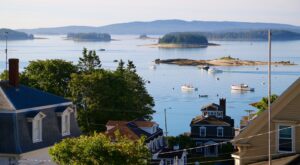Stoll to lead new program to train future leaders in the face of rapidly changing oceans
 With Earth’s oceans facing rapid climate and ecological change, University of Maine faculty will use a $3 million award from the National Science Foundation to create a new training program for graduate students that will support the next generation of marine science and conservation professionals.
With Earth’s oceans facing rapid climate and ecological change, University of Maine faculty will use a $3 million award from the National Science Foundation to create a new training program for graduate students that will support the next generation of marine science and conservation professionals.
Over the next five years, Joshua Stoll and his colleagues will design and implement a new traineeship program for master’s and doctoral students focused on ecosystem science amid rapid ocean change. Stoll is a UMaine associate professor of marine policy and a Mitchell Center faculty fellow. Their work will support members of coastal communities throughout the Gulf of Maine region, particularly those dependent on fishing and other natural resources, to adapt to climate change.
This new graduate education opportunity, which is funded through NSF’s Research Traineeship (NRT) program, will support at least 45 master’s and doctoral students, including 23 NSF-funded trainees, in the fields of marine ecology, oceanography, genomics, computational and social sciences. The training will incorporate an emerging discipline called ecosystem-based management.
Ecosystem-based management is place-based management of human interactions with marine species and ecosystems that contributes to the resilience and sustainability of the whole system. Practitioners use a variety of expertise — including biophysical and social sciences, and indigenous and local knowledge — to help solve societal problems and inform responses to environmental challenges, such as rapid ocean change.
“Our training program will prepare graduate students to be confident and effective leaders who are poised to support communities in Maine and beyond prepare for and adapt to climate change impacts,” Stoll says.
Other Mitchell Center faculty participating in the NSF-funded initiative are Christine Beitl, associate professor of anthropology; Kristina Cammen, associate professor of marine mammal science; Heather Leslie, professor of marine sciences; Darren Ranco, professor and chair of Native American Programs; and Anthony Sutton, assistant professor of Native American Programs and University of Maine Cooperative Extension.
